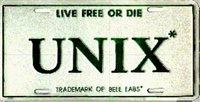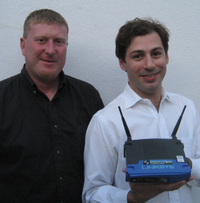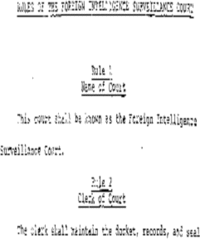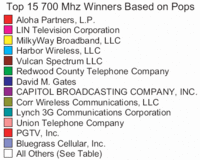If it has, this should appear legibleNot with the HTML formatting codes visible.
-jsq
If it has, this should appear legibleNot with the HTML formatting codes visible.
-jsq
 This was expected (cablecos, like telcos, want “freedom to degrade”),
but is now confirmed:
This was expected (cablecos, like telcos, want “freedom to degrade”),
but is now confirmed:
Comcast Corp. actively interferes with attempts by some of its high-speed Internet subscribers to share files online, a move that runs counter to the tradition of treating all types of Net traffic equally.Comcast was denying blocking or throttling as recently as August (and as near as I can tell they still do deny it). Numerous users reported it, and the AP has now confirmed it. However, what Comcast is doing isn’t precisely throttling. Continue readingThe interference, which The Associated Press confirmed through nationwide tests, is the most drastic example yet of data discrimination by a U.S. Internet service provider. It involves company computers masquerading as those of its users.
If widely applied by other ISPs, the technology Comcast is using would be a crippling blow to the BitTorrent, eDonkey and Gnutella file-sharing networks. While these are mainly known as sources of copyright music, software and movies, BitTorrent in particular is emerging as a legitimate tool for quickly disseminating legal content.
— Comcast blocks some Internet traffic, Tests confirm data discrimination by number 2 U.S. service provider, by Jeff Chiu, AP, 19 Oct 2007
 What does this have to do with net neutrality?
What does this have to do with net neutrality?
The Lindon-based SCO Group Inc. says it is planning to lay off 16 of its 123 employees and has asked a federal bankruptcy court to keep their identities secret because it fears they could be harassed.Unix was actually invented by a couple of researchers at AT&T Bell Labs, in an attic, in their spare time. AT&T never knew what to do with Unix, and eventually shuffled it off to Western Electric, whence it finally percolated over to SCO (I’ve probably omitted a few owners in between).SCO also is facing an effort to push ahead with a trial in federal court in Utah that could determine that SCO owes Novell as much as $35 million in licensing fees because of a ruling in a dispute over ownership of the Unix software program.
SCO filed for bankruptcy on Sept. 14, the result of a long court battle with Novell and IBM over ownership and use of the Unix computer operating system program. SCO claimed it, and not Novell, owned the copyright to Unix and that IBM had used parts of that code in developing the Linux operating system, whose code is open to the public and can be used or altered by individuals or companies for their own uses.
— Stricken SCO to lay off 16 workers, Lindon-based firm asks court to keep ex-employees ID secret, By Tom Harvey, The Salt Lake Tribune Article Last Updated: 10/15/2007 11:45:43 PM MDT
Meanwhile, Microsoft made billions out of an operating system (and clever legal ploys such as boot loader contracts). And Unix and its offshoots such as Linux underly everything from Apple’s OS-X to mobile phones to Google.
This seems to me the archetypical example of why we shouldn’t expect telephone companies to innovate, no matter how much of a monopoly they have. If we want innovation, we want net neutrality and competition.
-jsq
 Likely consolidation in Rural Local Exchange Carriers:
Likely consolidation in Rural Local Exchange Carriers:
RLECs are experiencing relatively little organic growth, the company says, because the increased revenues from such growing services as high-speed data “have not materially offset declining voice revenues. The erosion of the traditional wireline voice business of the RLECs, mainly by competition from cable multiple-system operators (MSOs) and wireless operators, has already led to some industry consolidation over the past year.”The RCCC acquisition may be one of these.Over the longer term, RLECs also face the uncertain effects of increased competition on service revenues for the rural operators as well as uncertainties on the regulatory side.
“In the absence of meaningful organic growth, acquisitions become a means for rural carriers to increase revenues, cash flow and diversity,” says John Culver, senior director at Fitch Ratings.
— Lack Of Growth Could Spell RLEC Demise, TelecomeWeb, 12 Oct 2007
-jsq
 This works for local electric companies; why not for ISPs:
This works for local electric companies; why not for ISPs:
Some ISPs simply discourage end users from offering WiFi connections to neighbors; most explicitly rule it out in their terms of service. But a small Canadian ISP called Wireless Nomad actually requires it.Sort of a local FON.Nomad does things a little differently. The company is subscriber-owned, volunteer-run, and open-source friendly. It offers a neutral Internet connection with no bandwidth caps or throttling, and it makes a point of creating wireless access points at the end of each DSL connection that can be used, for free, by the public. Bell Canada this is not.
— Sticking it to l’homme: Canadian co-op forms own ISP, By Nate Anderson, ars technica, October 10, 2007 – 11:58PM CT
-jsq
|
|
Rupert Murdoch’s MySpace has been caught in another act of alternative media censorship after it was revealed that bulletin posts containing links to Prison Planet.com were being hijacked and forwarded to MySpace’s home page. MySpace has placed Prison Planet on a list of blocked websites supposedly reserved for spam, phishing scams or virus trojans.Prison Planet says it’s certain this is deliberate, because it observed it going on for more than two weeks and multiple people have observed it. However, it doesn’t give any evidence that MySpace is blocking this particular site because it’s anti-war, nor of any other anti-war sites being blocked by MySpace. Nor for that matter that Rupert Murdoch had anything directly to do with it.— MySpace Censors Anti-War Websites, Prison Planet blocked as the model for government regulated Internet 2 gets a dry run, Paul Joseph Watson, Prison Planet, Tuesday, September 25, 2007
Now I wouldn’t be surpised if MySpace or some other social networking site took it upon itself to block anti-war sites, but I don’t see this case proven, and it’s the only one (the article mentioned InfoWars, but that’s a Prison Planet affiliate). For that matter, is being against the Iraq war even controversial anymore? Continue reading
 Just last week I was talking to somebody who used to work for the
Office for Technology Assessment, which was a bipartisan Congressional
research group that brought in various outside experts to help out.
She recognized me from various times I showed up.
Just last week I was talking to somebody who used to work for the
Office for Technology Assessment, which was a bipartisan Congressional
research group that brought in various outside experts to help out.
She recognized me from various times I showed up.
Serendipitously, Susan Crawford says “OTA: You Are Missed“.
Nearly a decade ago, Congress closed its Office of Technology Assessment. The president of the Federation of American Scientists, a former OTA employee, called the closing the “equivalent of a self-inflicted lobotomy.” Between 1974 and 1995 OTA produced 750 thorough reports about a wealth of scientific and technical studies.For example, such a group might have told Congress that current antitrust law isn’t well positioned to deal with problems of lack of competition since broadband was wrenched from one legal regime into another.Since then, the Congressional Research Service (thanks, CDT!) has been providing Congress with quick summaries of issues, but CRS doesn’t have the deep technical expertise that OTA did, or the resources to do sustained studies. The National Academies have the time and the resources, but they take too long and they have too many constituents to serve.
In re-writing the Telecom Act and jumping into having the FCC regulate the internet, it would be good to have a neutral, expert, bipartisan group advising Congress about the consequences of their actions.
-jsq
 The FCC won’t investigate possible illegal telco activities:
The FCC won’t investigate possible illegal telco activities:
The head of the U.S. Federal Communications Commission declined to investigate reports that phone companies turned over customer records to the National Security Agency, citing national security concerns, according to documents released on Friday.It seems unlikely the FCC will investigate active wiretapping, either. National security: the root password to the Constitution.FCC Chairman Kevin Martin turned down a congressional request for an investigation as a top intelligence official concluded it would “pose an unnecessary risk of damage to the national security,” according to a letter National Intelligence Director Michael McConnell sent to Martin on Tuesday.
— FCC won’t probe disclosure of phone records, By Reuters, October 6, 2007, 4:00 PM PDT
But Congress won’t let the telcos off the hook, well, not completely:
House Democrats have refused to submit to Bush administration requests to save telecommunications companies that assisted in a warrantless wiretapping scheme from lawsuits or prosecution, and they want to require judicial approval for future efforts to spy on Americans.The Foreign Intelligence Surveillance Court already is so secretive that although its court rules say it has a seal, there’s no image of it available anywhere on the web that I could find, and it already lets intelligence agencies apply within a few days for retroactive authorization for wiretaps.…
Under the new law, the Attorney General or Director of National Intelligence would be authorized to receive blanket warrants to eavesdrop on several foreign intelligence targets who could call into the United States, but the bill would restore FISA court reviews of targeting procedures and steps taken to “minimize” Americans’ exposure to surveillance. If an American is to become the “target” of surveillance, intelligence agencies would be required to seek an individualized warrant from the FISA court.
— Proposed FISA update would not give telecom companies legal protection, by Nick Juliano, RawStory, Tuesday October 9, 2007
Of course, this bill would have to pass the Senate and get signed by the president or get enough votes to override a veto. But at least the former law didn’t retroactively immunize the telcos, and this bill doesn’t, either.
-jsq
 There are other issues in 700Mhz spectrum allocation than AT&T’s bottom line:
There are other issues in 700Mhz spectrum allocation than AT&T’s bottom line:
“It is a life or death issue,” said Harold Hurtt, Houston Chief of Police and President of Major Cities Chiefs, an organization that represents 63 of the nation’s largest police organizations. Hurtt made his comments in a video interview distributed during the Association of Public-Safety Communications Officials (APCO) International 71st annual convention in Denver.And some of that spectrum has already been allocated. AT&T just cherrypicked the biggest previous 700Mhz spectrum holder, Aloha Partners, but there are more than a dozen others. Don’t be surprised if some of those get gobbled up, too.— 700 MHz On The Line by samc, dailywireless.org, Monday, September 5th, 2005 at 1:00 pm.
-jsq
 Why wait for the auction when there’s another way?
Why wait for the auction when there’s another way?
AT&T announced today that it has purchased 12MHz of spectrum in the prime 700MHz spectrum band from privately-held Aloha Partners for close to $2.5 billion. Aloha purchased the spectrum in Federal Communications Commission auctions held during 2001 and 2003, but hasn’t done much with the licenses since the auctions ended.And since Aloha got this batch of 700Mhz spectrum in a previous auction with no open access strings attached, AT&T can thumb its nose at Google about that. For the particular geographical locations that Aloha covers.The licenses to the spectrum cover around 196 million residents of the US and 72 of the 100 largest metropolitan areas, including the ten largest markets in the US. AT&T isn’t divulging much in the way of specifics for the bandwidth, other than saying that the company will use it for voice, data, and video. “Aloha’s spectrum will enable AT&T to efficiently meet this growing demand and help our customers stay connected to their worlds,” said Forest Miller, AT&T’s group resident for corporate strategy and development.
— AT&T surprises with beachfront 700MHz spectrum purchase By Eric Bangeman, ars technica, October 09, 2007 – 12:29PM CT
-jsq